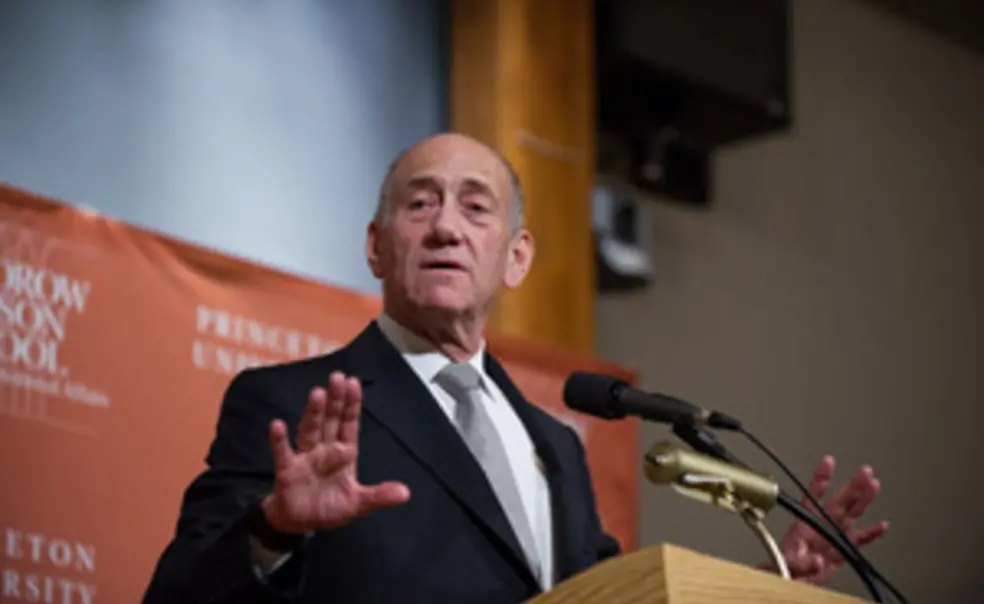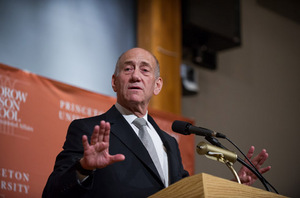Olmert discusses territorial issues, nuclear Iran in campus speech
Former Israeli prime minister Ehud Olmert during his March 28 lecture on campus. (Photo: Sameer A. Khan/Courtesy Woodrow Wilson School)
Former Israeli Prime Minister Ehud Olmert spoke about his country’s future to a packed audience in McCosh 50 on March 28. Olmert discussed the necessity of Israeli territorial concessions, encouraged American and international efforts to stop Iranian nuclear development, and answered some controversial questions from the audience.
President Tilghman introduced Olmert, who served as prime minister from 2006 to 2009 and the mayor of Jerusalem from 1993 to 2003, as well as in the Knesset, the Israeli parliament, for nine terms beginning in the 1970s. A former head of the liberal centrist Kadima party, he resigned from his position in 2009 while under investigation for corruption.
Olmert began his talk with humor, saying, “It’s always amazing to see how sexy is the Israeli-Palestinian conflict in almost every corner of the world.”
He discussed the intense difficulty of making decisions “in a position where you are the last stop,” adding, “It is more difficult to be the mayor of Jerusalem than the prime minister of Israel.”
To the Jewish people, he explained, Israel’s territorial possessions, particularly its historic and religious capital of Jerusalem, are “indelibly linked” to their history and experiences. However, according to Olmert, holding some disputed territories has butted against has butted against Israel’s core liberal values of equality and democracy.
Olmert acknowledged that if the territories had no historical or cultural significance to the Israeli people, any concessions would have no meaning. “Jerusalem is perhaps the most powerful proof that rather than try to create an artificial reality that will explode in our face, we have to make this very painful mistake which kills the hearts of every Jew, and help create two capitals in two parts of Jerusalem: the Arab side — the capital of the Palestinian state — and the Jewish side,” he said.
He urged Israel’s leadership to find the “courage and inner emotional strength” to make difficult decisions.
Olmert also discussed the danger Iran and its nuclear program poses to Israel, maintaining his nation’s right to use a military option against that threat.
“When the president of such a country … talks about one thing, the need to wipe off the map the country of Israel, and at the same time his country invests billons and billions of dollars to become capable of building nuclear weapons? Nobody can expect the state of Israel to remain indifferent,” Olmert said.
However, he believes that before using military options, Israel should cooperate with “stronger, more influential” nations, particularly the United States. “I think that the American leadership will carry on this effort and Israel will be a part of it until Iran is stopped for the well-being of the region, of the Iranian people, and of the entire world,” he said.
Olmert concluded his talk with a pessimistic take on last year’s democratic revolutions in the Arab world, saying that he is “somewhat afraid that the Arab Spring will lead into the Arab Winter.” He described Israel’s previously peaceful relationship with deposed Egyptian President Hosni Mubarak and expressed concern over the uncertainty of future relations with unknown regimes.
During the question and answer session after Olmert’s speech, Lucie Wright ‘14, the president of the Princeton Committee on Palestine, asked a pointed question on Olmert’s opinion on the “disproportionate use of force” Israel employed in its three-week war against Hamas in 2009, which involved heavy bombing of Hamas targets in Gaza.
He responded with an impassioned condemnation of Hamas as a terrorist organization. While Olmert acknowledged that “maybe we have exaggerated every now and then,” he decried the “brutal” tactics that Hamas has used against Palestinians as well as Israelis.
“One thing I know, and I kept saying this all the time, I’m ready to make the most dramatic sacrifices for peace,” Olmert said. “I will fight with all the power I possess to save the life of one child, one Israeli child, that is threatened by a Palestinian terrorist,” he continued, eliciting a round of applause from the audience.
In an email to PAW, Wright said she appreciated what she viewed as an effort to acknowledge the disproportionate use of military force, but she urged Olmert to value Palestinian lives as he did Israelis. “I would challenge him and the audience members who showed such support for his response to go beyond a mere acceptance of this loss as necessitated and justified by the security of some; all civilians, Israeli and Palestinian alike, deserve security against indiscriminate use of military force and accountability of those who practice it,” she said.
Samson Schatz ’13, a former board member of Tigers for Israel, was impressed with Olmert’s eloquence and candor. “I think he answered some of those questions in the best, most genuine way I've ever heard,” Schatz said. “He really succeeded in hammering home the issues of vital importance for the state of Israel, while also adding a very human element of rebuke to his fellow policy makers. His candid demeanor was quite refreshing.”

Sarah Xiyi Chen ’13 is a Woodrow Wilson School major from Arcadia, Calif.













No responses yet